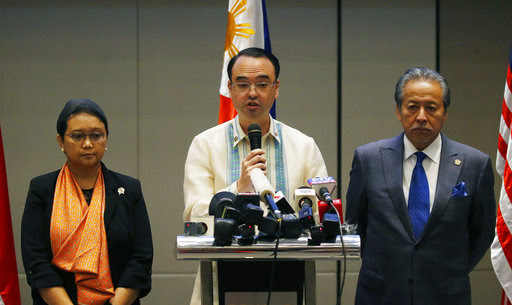
Philippine Foreign Affairs Secretary Alan Peter Cayetano, center, flanked by Indonesian Foreign Minister Retno Marsudi, left, and Malaysian Foreign Minister Anifah Haji Aman, reads the joint statement following their Trilateral Security Meeting in suburban Pasay city, southeast of Manila, Philippines Thursday, June 22, 2017. AP
The Philippines, Indonesia and Malaysia have agreed to closely cooperate to halt the flow of militants, weapons, funds and extremists propaganda across their borders as they expressed alarm over recent attacks in their region.
Foreign Secretary Alan Peter Cayetano and his Indonesian and Malaysian counterparts held talks in Manila on Thursday with top security officials on a joint plan of action as the Philippine military battled Islamic State (IS)-linked terrorists in Marawi City.
The trilateral meeting was held after President Duterte and Indonesian President Joko Widodo spoke by phone on Wednesday night and agreed to intensify cooperation in the fight against terrorism and violent extremism.
Presidential spokesperson Ernesto Abella said on Thursday that the phone call between the two leaders was “productive and fruitful,” with Widodo reasserting Indonesia’s commitment to fight terrorists and help bring peace to Mindanao.
“President Widodo reaffirmed Indonesia’s commitment to support the Philippines in countering terrorism, including restoring peace and stability in the southern Philippines,” Abella said.
He said Mr. Duterte welcomed Widodo’s pledge and stressed his administration’s resolve to work closely with Indonesia and like-minded states in fighting terrorism to maintain peace in the region.
Jolted by the May 23 attack on Marawi, the Philippines, Indonesia and Malaysia have launched joint maritime patrols to prevent piracy, kidnapping and the cross-border movement of fugitives and extremists.
Malaysians and Indonesians were among foreign fighters killed by the military in Marawi, where it is battling Maute and Abu Sayyaf terrorists who seized the city to open an enclave for the Middle East-based IS jihadist group in Southeast Asia.
Joint plan of action
The fighting enters its fifth week on Friday, with the military saying the terrorists have been cornered in a square-kilometer pocket of the city and troops are advancing on them.
On Thursday, Cayetano and his Indonesian and Malaysian counterparts gathered in Manila with top security officials to discuss a joint plan of action to deal with the threat of extremism in the region.
“This threat is beyond borders. No country is immune from terrorism,” said Indonesian Foreign Minister Retno Marsudi.
She said the threat of terrorism was “even more worrying” because of the use of social media.
“Therefore cooperation among the three of us is a necessity, cooperation among the three of us is a must,” she said.
Malaysian Foreign Minister Anifah Aman said terrorists today had “proven to be experts in using social media to recruit members in faraway countries.”
“In the past, terrorism maintained a sense of self-preservation, unlike today. It is far more difficult to stop people who are willing to die,” he said.
Anifah also said counterterrorism efforts must be innovative, since radical groups have taken advantage of social media to spread their perverted ideology and recruit from around the world.
“There is a need to agree to formalize our cooperation through the establishment of mechanisms which will include all relevant stakeholders,” he added, citing the need for prompt exchange of information and to strengthen intelligence gathering, and assist investigation of cross-border terrorist activities.
Armed Forces of the Philippines Chief of Staff Gen. Eduardo Año, Philippine National Police Chief Ronald dela Rosa and National Security Adviser Hermogenes Esperon attended the meeting with their Indonesian and Malaysian counterparts.
At the end of the three-hour meeting, Cayetano was asked whether the Philippines got information from Indonesia and Malaysia to help the military defeat the terrorists in Marawi.
“We have achieved that purpose,” Cayetano replied, without elaborating.
Joint statement
In a joint statement issued after the meeting, the three diplomats expressed “concern over the recent incidents of terrorism and violent extremism in their countries” and their desire to plot joint strategies to combat it.
The three neighboring countries also agreed to enhance intelligence and information sharing on potential, imminent and real threat; stop the flow of terrorist financing; contain the spread of terrorism and related content in cyberspace and on social media; prevent and suppress terrorist exploitation of information and communication technology.
They also agreed to prevent and stop arms smuggling and the movement of terrorists; consider specialized military and law enforcement training, and counter the narrative of extremist groups through education and promotion of tolerance, moderation and unity in diversity. —WITH REPORTS FROM THE WIRES

